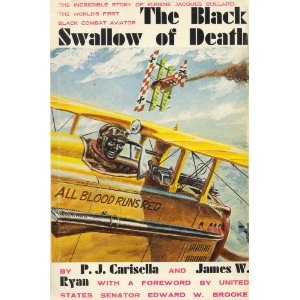A man of greatness may find himself in untoward, unfair situations. A man of greatness may, through no fault of his own, be ostracized or discriminated against. A man of greatness may be victimized by unfortunate events, but a man of greatness is never a hapless victim. What another man views as an impassable obstacle, a man of greatness sees as a temporary detour on the path to success. A man of greatness may get knocked down by the harsh vicissitudes of life but he always rises and re-enters the fray. A man of greatness creates triumph amidst tragedy, and emerges a champion, even after death.
Eugene Bullard was born in the deep South in 1895. He was poor, black, and seemed destined for a life of menial labor and crop-picking. He was expected to be meek and subservient and downtrodden. But Bullard felt a stirring of greatness and knew he was destined for a better life. At age 8 he ran away from home, to establish his independence. He never returned. By age 12 he stowed away on a ship and landed in Europe, establishing his eventual home in Paris, France.
When World War I begins, Bullard joins the French Foreign Legion. His unit suffers devastating losses in pitched, blood-drenched battles and Bullard establishes a reputation as a brave, resourceful, vicious soldier. He wins commendations and is respected by his comrades. He is injured in battle then requests, and receives, a transfer to the famed Lafayette Flying Corps in the French Air Force. The role of a combat pilot is new, exciting, adventurous, and very hazardous. Bullard becomes the first black fighter pilot. As always, he excels.
As always, he asserts his independence. He disagrees with a superior, fisticuffs ensue, and Bullard is punished with a return to the infantry. The normal punishment is death by firing squad, but Bullard is such a capable fighter that the French spare his life. He fights in several more battles, in exemplary fashion. When the United States enters the war, Bullard requests to join their Air Force but is refused because of his skin color. Undeterred, he returns to his French unit and continues to fight.
After the war, Bullard opens several successful businesses, marries a legitimate countess and has several children. The Germans invade and begin World War II hostilities. Bullard first becomes a citizen spy and reports to French authorities. Later, he becomes a sniper and provides protection for families fleeing the German blitzkrieg. During a pitched exchange of gunfire, he is wounded in the spine. In the interest of his young daughters, he relocates to the United States where he struggles to recover from his wounds and is the victim of brutal racism. He dies, mostly forgotten, almost alone and almost penniless.
His exploits and his brave conduct and his refusal to be cowed by factors that would have destroyed a lesser man are remembered, however. His exploits as a fighter pilot are documented in a book entitled The Black Swallow of Death, and his story is featured in the movie Flyboys. After his death, the United States Air Force admits their mistake and he receives a posthumous commission as an officer. Even in death, Bullard is a champion.
From September 2010, http://raising-a-man.tumblr.com
Eugene Bullard was born in the deep South in 1895. He was poor, black, and seemed destined for a life of menial labor and crop-picking. He was expected to be meek and subservient and downtrodden. But Bullard felt a stirring of greatness and knew he was destined for a better life. At age 8 he ran away from home, to establish his independence. He never returned. By age 12 he stowed away on a ship and landed in Europe, establishing his eventual home in Paris, France.
When World War I begins, Bullard joins the French Foreign Legion. His unit suffers devastating losses in pitched, blood-drenched battles and Bullard establishes a reputation as a brave, resourceful, vicious soldier. He wins commendations and is respected by his comrades. He is injured in battle then requests, and receives, a transfer to the famed Lafayette Flying Corps in the French Air Force. The role of a combat pilot is new, exciting, adventurous, and very hazardous. Bullard becomes the first black fighter pilot. As always, he excels.
As always, he asserts his independence. He disagrees with a superior, fisticuffs ensue, and Bullard is punished with a return to the infantry. The normal punishment is death by firing squad, but Bullard is such a capable fighter that the French spare his life. He fights in several more battles, in exemplary fashion. When the United States enters the war, Bullard requests to join their Air Force but is refused because of his skin color. Undeterred, he returns to his French unit and continues to fight.
After the war, Bullard opens several successful businesses, marries a legitimate countess and has several children. The Germans invade and begin World War II hostilities. Bullard first becomes a citizen spy and reports to French authorities. Later, he becomes a sniper and provides protection for families fleeing the German blitzkrieg. During a pitched exchange of gunfire, he is wounded in the spine. In the interest of his young daughters, he relocates to the United States where he struggles to recover from his wounds and is the victim of brutal racism. He dies, mostly forgotten, almost alone and almost penniless.
His exploits and his brave conduct and his refusal to be cowed by factors that would have destroyed a lesser man are remembered, however. His exploits as a fighter pilot are documented in a book entitled The Black Swallow of Death, and his story is featured in the movie Flyboys. After his death, the United States Air Force admits their mistake and he receives a posthumous commission as an officer. Even in death, Bullard is a champion.
From September 2010, http://raising-a-man.tumblr.com

 RSS Feed
RSS Feed
